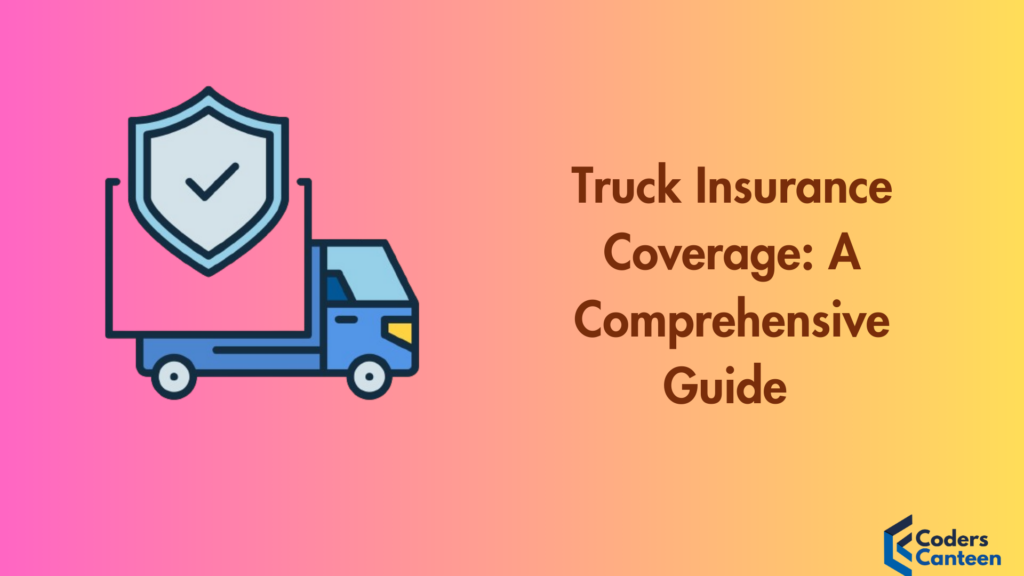In the dynamic world of truck ownership, securing the right insurance coverage is crucial to protect your investment and ensure operational continuity. This comprehensive guide explores essential types of coverage every truck owner should have, offering detailed insights and practical advice to navigate the complexities of commercial truck insurance effectively.

Understanding Essential Truck Insurance Coverage
Truck insurance encompasses a range of coverage options tailored to mitigate risks inherent in commercial trucking operations. Understanding these options is fundamental for compliance and comprehensive protection.
Primary Liability Insurance
Primary liability insurance is a legal requirement for all commercial trucks operating on public roads in the United States. It covers damages and injuries to others in accidents where you or your drivers are at fault, providing financial protection against liability claims.
Physical Damage Coverage
- Collision Coverage: Protects your truck from damage resulting from collisions with other vehicles or objects.
- Comprehensive Coverage: Covers non-collision incidents such as theft, vandalism, fire, or natural disasters, ensuring your truck is protected against a wide range of risks.
Cargo Insurance
Cargo insurance safeguards the goods or freight your truck transports. It covers losses from damage, theft, or loss during transit, shielding your business from financial liability.
Non-Trucking Liability Insurance (Bobtail Insurance)
Bobtail insurance provides liability coverage when your truck is operated without a trailer or outside of work duties. It fills gaps left by primary liability insurance, offering protection during personal use of the truck.
General Liability Insurance
General liability insurance covers claims of bodily injury or property damage arising from your business operations or premises. It protects your business from lawsuits and associated legal expenses.
Uninsured/Underinsured Motorist Coverage
This coverage protects you and your truck in accidents where the at-fault driver does not have sufficient insurance coverage. It ensures you are financially protected against uninsured or underinsured motorists.
Factors Influencing Truck Insurance Costs
Several factors influence the cost of truck insurance premiums, requiring careful consideration to optimize coverage and manage costs effectively.
- Driving Record: A clean driving record reduces premiums, demonstrating lower risk to insurers.
- Truck Type and Cargo: Trucks transporting hazardous materials or high-value cargo face higher premiums due to increased risk.
- Coverage Limits and Deductibles: Higher coverage limits and lower deductibles result in higher premiums but offer more extensive protection.
- Location: Operating in high-risk areas with higher accident rates may lead to higher premiums.
- Safety Measures: Implementing safety protocols and security devices can lower insurance costs by reducing the likelihood of accidents or theft.
- Claims History: A history of frequent claims or large claim amounts can increase insurance premiums, emphasizing the importance of proactive risk management.
Choosing the Right Coverage for Your Truck
Selecting appropriate insurance coverage involves a systematic approach to assess your business needs, comply with legal requirements, compare insurance options, and select a reputable insurer.
- Assess Your Coverage Needs: Evaluate the specific risks associated with your trucking operations, including cargo type, routes traveled, and operational environment.
- Understand Legal Requirements: Familiarize yourself with mandatory insurance requirements in your jurisdiction to ensure compliance and avoid penalties.
- Compare Insurance Quotes: Obtain quotes from multiple insurers to compare coverage options, premiums, deductibles, and policy terms. Consider coverage comprehensiveness and additional benefits beyond price.
- Research Insurance Companies: Investigate insurers’ financial stability, customer service reputation, and claims handling process. Choose an insurer with a strong track record of reliability and responsiveness.
- Review Policy Details: Carefully review policy terms, conditions, and exclusions to understand coverage extent and any limitations that may impact your business operations.
- Consider Additional Coverages: Depending on your business needs, explore additional coverages such as general liability insurance, hired auto insurance, or umbrella insurance to enhance your overall risk management strategy.
- Consult with an Insurance Professional: Seek advice from an insurance agent or broker specializing in commercial truck insurance. Utilize their expertise to gain tailored insights and recommendations.
Also Read:
Frequently Asked Questions (FAQs)
1. Is truck insurance mandatory?
Yes, primary liability insurance is mandatory for all commercial trucks operating on public roads in the United States to cover liability for bodily injury and property damage.
2. What does cargo insurance cover?
Cargo insurance covers the goods or freight your truck transports against damage, theft, or loss during transit, providing financial reimbursement for covered losses.
3. How can I lower my truck insurance premiums?
To reduce premiums, maintain a clean driving record, implement safety measures, opt for higher deductibles, and compare quotes from multiple insurers.
4. How do I file an insurance claim?
To file a claim, promptly contact your insurer’s claims department after an incident. Provide detailed documentation, such as accident reports and photos, to support your claim and expedite the claims process.
Conclusion
Choosing the right insurance coverage for your truck is crucial to protect your investment and ensure business continuity. By understanding available coverage types, assessing specific needs, and selecting a reputable insurer, truck owners can effectively mitigate risks and navigate the complexities of commercial truck insurance with confidence.
Regularly review insurance policies to adapt to business growth and regulatory changes. With proactive risk management strategies and the right insurance partner, truck owners can safeguard assets, mitigate liabilities, and focus on achieving long-term success in the competitive trucking industry.